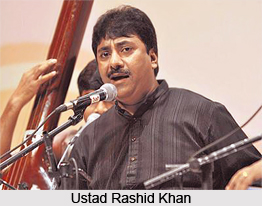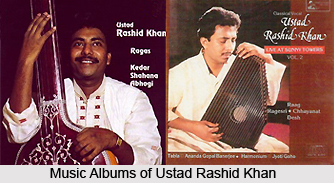 Ustad Rashid Khan is one of the leading Indian classical vocalists of the North Indian Hindustani music tradition. He admits his lineage to the Rampur-Sahaswan Gharana. Ustad Inayat Hussain is his great grand father. Ustad Rasid Khan was a child prodigy who with his technical grasp, creative aesthetics, deep, rich and sonorous voice grew as the legendary Indian classical performer. Through his performance, voice, phrasing, virtuosity, sensitivity, khayal singing, alaap, slow or fast tempo, bandish, bol-bunt or taan and total control over sur and taal he has always been mesmerizing his audiences. Pandit Bhimsen Joshi, maestro of Indian classical music, a few years ago acknowledged Ustad Rasid Khan as the person who is an assurance for the future of Indian vocal music.
Ustad Rashid Khan is one of the leading Indian classical vocalists of the North Indian Hindustani music tradition. He admits his lineage to the Rampur-Sahaswan Gharana. Ustad Inayat Hussain is his great grand father. Ustad Rasid Khan was a child prodigy who with his technical grasp, creative aesthetics, deep, rich and sonorous voice grew as the legendary Indian classical performer. Through his performance, voice, phrasing, virtuosity, sensitivity, khayal singing, alaap, slow or fast tempo, bandish, bol-bunt or taan and total control over sur and taal he has always been mesmerizing his audiences. Pandit Bhimsen Joshi, maestro of Indian classical music, a few years ago acknowledged Ustad Rasid Khan as the person who is an assurance for the future of Indian vocal music.
Early Life of Ustad Rashid Khan
Ustad Rashid Khan was born on 1st July in the year 1966 at Budaun, Uttar Pradesh. He was inducted to the music at very tender age and received fundamental training from his maternal granduncle, Ustad Nissar Hussain Khan. Under the strict discipline of Ustad Nissar Hussain Khan, Ustad Rashid Khan used to undergo voice training from four in the morning. He used to practice one single musical note for the whole day. For a child, this kind of training undoubtedly is tedious, but this left an immense impact on his singing which led to his easy mastery of taan (glissandos) and layakaari. Ustad Ghulam Mustafa Khan, the famed Indian classical vocalist, was his uncle. During his childhood Ustad Rashid Khan possessed a little interest in music, but it gradually increased with age. During his time at Mumbai, he has been trained under Ustad Ghulam Mustafa Khan.
 Career of Ustad Rashid Khan
Career of Ustad Rashid Khan
In the year 1977, Ustad Rasid Khan had his first stage performance. In the following year he performed at the ITC concert held at Delhi. Later in the year 1980, as Ustad Nissar Hussain Khan, his mentor, shifted to the ITC Sangeet Research Academy (SRA), Kolkata, Ustad Rashid Khan along with him came to live in Kolkata and was admitted to the academy. The academy admitted him in the year 1994, as musician. Ustad Rashid Khan started exhibiting his unique style of performance through his Vilambit Khayals. His presentation of Vilambit Khayals reflected the style that his maternal uncle propagated. Ustad Rashid Khan always attempted to use properly the traits of Rampur Sahaswan style in his execution. Taankari done by him has been regarded as a powerful one. Ustad Rashid Khan has been acknowledged as the master of Tarana. The quality of voice that he possesses has also been regarded as the reflection of best tradition of the Rampur Sahaswan Gharana. Ustad Rashid Khan is also accredited with the experimentation of fusing pure Hindustani music with lighter musical genres. He has also performed in `Jugalbandis` with other prominent artists. His singing style is unique and his renditions exhibit melodic elaboration with emotional overtones.
Performances of Ustad Rashid Khan
Throughout his professional career Ustad Rashid Khan has exhibited his performance at highly esteemed occasions. In the year 1981, he has performed at the Bombay Gharana Sammelan. At the release of "Great Masters of Indian Music" in the year 1986, he has exhibited his performance which was conducted by Festival of India Committee. Acknowledging his talent, All India Radio and Doordarshan started broadcasting his executions from the year 1987. CBS Music Co. released his first music album after which many other companies released cassettes with him. In the year 1989, 1990 and 1994, he executed at the Tansen Classical Music Conferences. In the year 1989, 1992, 1993, and 1994, he has performed at Dover Lane Music Conference held in Kolkata. Ustad Rashid Khan has also performed abroad in the countries like U.K., France, U.S.A., Canada, Italy, Bangladesh and Nepal.
Achievements of Ustad Rashid Khan
Ustad Rashid Khan has been honoured with many prestigious accolades for his substantial contribution in the field on Indian classical music. He was honoured with Padma Shri in the year 2006. In the same year he also received Sangeet Natak Akademi Award. He was awarded with Global Indian Music Awards (GIMA) in 2010 and Maha Sangeet Samman Award in 2012.




















